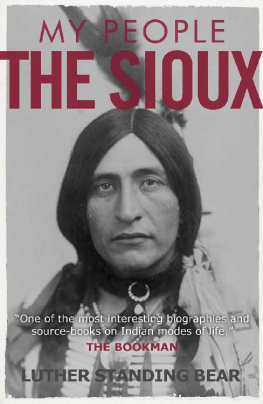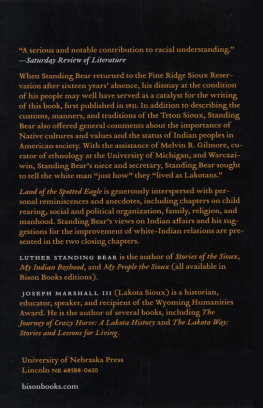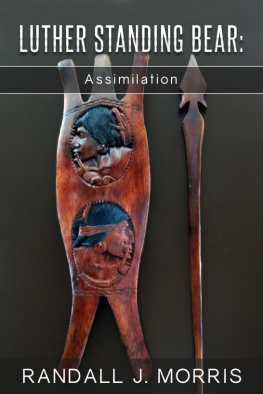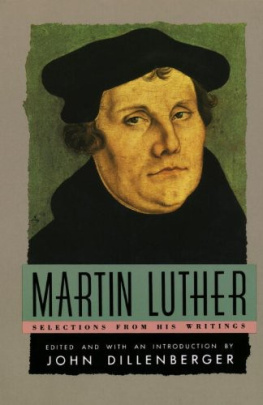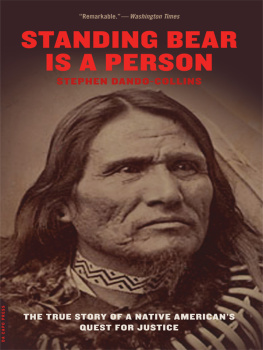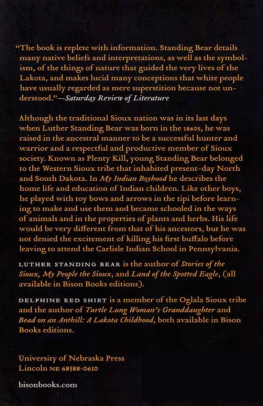Luther Standing Bear - My People The Sioux
Here you can read online Luther Standing Bear - My People The Sioux full text of the book (entire story) in english for free. Download pdf and epub, get meaning, cover and reviews about this ebook. year: 2017, publisher: Hegne Publishing, genre: Non-fiction / History. Description of the work, (preface) as well as reviews are available. Best literature library LitArk.com created for fans of good reading and offers a wide selection of genres:
Romance novel
Science fiction
Adventure
Detective
Science
History
Home and family
Prose
Art
Politics
Computer
Non-fiction
Religion
Business
Children
Humor
Choose a favorite category and find really read worthwhile books. Enjoy immersion in the world of imagination, feel the emotions of the characters or learn something new for yourself, make an fascinating discovery.
- Book:My People The Sioux
- Author:
- Publisher:Hegne Publishing
- Genre:
- Year:2017
- Rating:3 / 5
- Favourites:Add to favourites
- Your mark:
- 60
- 1
- 2
- 3
- 4
- 5
My People The Sioux: summary, description and annotation
We offer to read an annotation, description, summary or preface (depends on what the author of the book "My People The Sioux" wrote himself). If you haven't found the necessary information about the book — write in the comments, we will try to find it.
My People The Sioux — read online for free the complete book (whole text) full work
Below is the text of the book, divided by pages. System saving the place of the last page read, allows you to conveniently read the book "My People The Sioux" online for free, without having to search again every time where you left off. Put a bookmark, and you can go to the page where you finished reading at any time.
Font size:
Interval:
Bookmark:
MY PEOPLE, THE SIOUX
Chief Standing Bear
First published in 1928, by Luther Standing Bear.
This edition published in 2017.
IN LOVING MEMORY OF MY FATHER
CHIEF STANDING BEAR THE FIRST
A WARRIOR OF DISTINCTION
A GREAT LEADER AND COUNSELLOR AMONG HIS PEOPLE
IN LATER LIFE AN EARNEST CHRISTIAN
WHO WALKED THE TRAILS OF PEACE AND HARMONY
CONSTANTLY STRIVING FOR THE BETTERMENT OF HIS RACE
Table of Contents
PREFACE
THE preparation of this book has not been with any idea of self-glory. It is just a message to the white race; to bring my people before their eyes in a true and authentic manner. The American Indian has been written about by hundreds of authors of white blood or possibly by an Indian of mixed blood who has spent the greater part of his life away from a reservation. These are not in a position to write accurately about the struggles and disappointments of the Indian.
White men who have tried to write stories about the Indian have either foisted on the public some bloodcurdling, impossible thriller; or, if they have been in sympathy with the Indian, have written from knowledge which was not accurate and reliable. No one is able to understand the Indian race like an Indian.
Therefore, I trust that in reading the contents of this book the public will come to a better understanding of us. I hope they will become better informed as to our principles, our knowledge, and our ability. It is my desire that all people know the truth about the first Americans and their relations with the United States Government.
I hereby express my appreciation for assistance in the preparation of the manuscript of this book to my good friends Mr. E. A. Brininstool, of Los Angeles, and Mr. Clyde Champion, of Alhambra, California; also to my niece Was-te-win and her husband William Dittmar, whose aid and encouragement have been of the utmost value to me.
INTRODUCTION
A PAINTER must know how to mix his paints and he must know how to paint, but whether he reproduces nature or makes a daub depends on his knowledge of the subject he is painting. To write of the West one must know the West.
Being master of all the technique in the world doesnt give a man knowledge of what he is writing which accounts for much of the blundering, haphazard vaporings that are written of the West. Libelous stuff, material founded on hearsay, or gathered through a smattering of ill-digested reading, which, in turn, is the output of those so full of their own confidence, they must have been bored in the writing.
Here is a story written by a blanket Indian, the first son of a fighting Sioux. Aside from its beauty and naivete, the book is invaluable. It is history.
The West was so big: even great men that wrote and painted what they loved could not grasp it all.
Theodore Roosevelt, Frederic Remington, Owen Wister, put the old frontier on the map. These men had every attribute to illustrate the West. They were shy on only one thing KNOWLEDGE GAINED BY ACTUAL EXPERIENCE. What a pity that such men had not lived the life of the West as Chief Standing Bear did or as Charlie Russell did! Russells work will go down to our childrens childrens children for truth looks out of the canvas.
Owen Wister great scholar, typical American gentleman could write stories of the West that made the blood leap in the telling. How unfortunate that he had not spent more years on the frontier! Had he done so, he would never have made The Virginian (in his classic of that name), out of simple duty, lead a posse to run down and hang his pardner who was wanted for cattlestealing. Had the Virginian been a real Westerner, had he consented to lead that posse, he would have led them in the opposite direction. And the posse would have loved him for it. The morals of the people of the West seemed to be governed by the altitude, and it is mighty high ground from the old Missouri to where the mountains go down to the sea.
The author of this book may be a bit short on education. I cant say how short because I do not know enough to judge, but he has a story to tell one that he learned IN LIFE. The tipis of his people were the first skyscrapers. Trapping and hunting was their calling, but philosophy was their life.
It is a tale told of a people whipped by a stronger race like dumb animals for deeds beyond their understanding. I am sure that all men will enjoy and applaud their play and that no man will laugh at their suffering.
General Benteen, of the United States Army, said of the Sioux Indians, They are the greatest warriors that the sun ever shone on. We should be proud of these Sioux Indians, for they are Americans, and they come from a country and belong to a day when tongues were seldom hung in the middle, where folks didnt carry silver in their pockets until it turned black, where, if a gambler took your last dollar, hed spend it on you, and where lots of small children were not so sure but that some angels wore whiskers and cussed a little bit.
WILLIAM S. HART (TA-SUNKE-WITKO)
CHAPTER I: PLENTY KILL
THE Sioux tribe, to which I belong, has always been a very powerful nation. Many years ago they traveled all over the Western country, hunting, camping, and enjoying life to its utmost, in the many beautiful spots where they found the best wood and water.
It was in a cold winter, in the month when the bark of the trees cracked, in the year of breaking up of camp, that I was born. I was the first son of Chief Standing Bear the First. In those days we had no calendars, no manner of keeping count of the days; only the month and the year were observed. Something of importance would, naturally, happen every year, and we kept trace of the years in that manner. After I went to school and learned how to count back, I learned that that year of breaking camp was A.D. 1868; the month when the bark of the trees cracked was December. Consequently I was born in December, 1868.
My mother was considered the most beautiful young woman among the Sioux at the time she married my father. Her name was Pretty Face. My grandfather my fathers father was a chief, and accounted a very brave man. He had captured many spotted horses from other tribes in their wars with one another. Therefore, when my father was born, he was given the name of Spotted Horse. This he kept until he was old enough to go on the war-path and earn his own name. He once told me how he received the name of Standing Bear. His story, as near as I can remember it, was as follows:
One of our hunting scouts returned with the news that the Pawnees were on our hunting-grounds and were killing our game; so all the braves prepared themselves for war. We knew we had a hard enemy to face, as the Pawnees were very expert with the bow and arrow. If one of these Pawnees was knocked down, he was just as liable to arise with his bow in hand, or even if lying flat on his back, he would have an arrow in his bow all ready to let drive.
We started and traveled quite a long way. When we came up over a hill, we could see the Pawnees down in the valley. They had just finished killing a lot of buffalo, and the game lay scattered here and there. Each man was busy skinning the animal he had killed. Our men rode into them as fast as they were able. I was riding a sorrel horse at this time, and he was a good runner.
When the Pawnees saw us coming, they scattered to get their horses and leave. We gave chase after them. I took after some men who went over a hill, but they had too good a start, and I knew there was no use tiring my horse out chasing them, so I turned back. As I was nearing my own people, I observed several of them in a bunch, and I rode in close to see what was the matter.
When I got there, the Sioux were all in a circle around one Pawnee. His horse had got away from him in the excitement and he was left on foot. But he had a bow and arrow in his hand and was defying any of the Sioux to come near. He was a big man and very brave. When our men would shoot an arrow at him and it struck, he would break the arrow off and throw it away. If they shot at him and missed, he would pick up the arrows and defy the Sioux to come on.
Next pageFont size:
Interval:
Bookmark:
Similar books «My People The Sioux»
Look at similar books to My People The Sioux. We have selected literature similar in name and meaning in the hope of providing readers with more options to find new, interesting, not yet read works.
Discussion, reviews of the book My People The Sioux and just readers' own opinions. Leave your comments, write what you think about the work, its meaning or the main characters. Specify what exactly you liked and what you didn't like, and why you think so.

